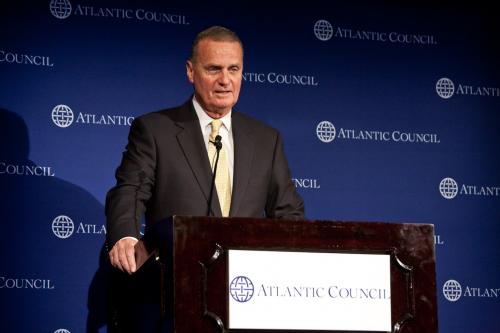 In a provocative closed door session yesterday, National Security Advisor Jim Jones proclaimed that “NATO must be prepared to address, deny, and deter the full spectrum of threats, whether emanating from within Europe, at NATO’s boundaries, or far beyond NATO’s borders.”
In a provocative closed door session yesterday, National Security Advisor Jim Jones proclaimed that “NATO must be prepared to address, deny, and deter the full spectrum of threats, whether emanating from within Europe, at NATO’s boundaries, or far beyond NATO’s borders.”
When Jones talks NATO, people listen. He’s a former Supreme Allied Commander and Atlantic Council chairman and has more than four decades of experience in the international security arena. And, when he addressed the Washington Strategic Concept Seminar yesterday, he had a lot to say.
His challenge for an Alliance that has kept the West safe for six decades will be welcome news on this side of the Pond but perhaps not so much for European Allies struggling to fund, man, and maintain public support for existing missions.
“NATO must be more lean, agile, and flexible to effectively address the security challenges before it. NATO must move beyond its doctrine of static defense of the 20th Century to become a more proactive Alliance for the modern era.”
One could argue that NATO has done this. After all, the Soviet invasion against which the Alliance was initially formed to deter never materialized — perhaps precisely because deterrence worked. But the Alliance has conducted peacekeeping operations in Bosnia, combat operations in Kosovo, and out-of-area operations in Afghanistan. Indeed, Jones led Marines in Bosnia and commanded NATO during the early days of the Afghanistan mission.
But it’s true that most Allies are reluctant to engage in non-Article 5 operations. Since, with the possible exception of potential members on its own borders, an armed attack by Russia is an implausible threat, that leaves a terrorist attack by a non-state actor as the only plausible Article 5 threat. Is that enough to justify the massive infrastructure of a permanent Alliance? Probably not.
In Lord Ismay’s classic formulation, the purpose of NATO was “To keep America in, to keep Russia out and to keep Germany down.” The last two legs of that mission are, happily, obsolete. Given the global posture of the United States, many in this country will question whether NATO is worth the effort if it can’t be counted on the assist in a myriad of missions that benefit Western interests.
So, what, then?
“NATO must be prepared to address, deny, and deter the full spectrum of threats, whether emanating from within Europe, at NATO’s boundaries, or far beyond NATO’s borders. Given the complexity of the threat environment, NATO’s assessment of the threat spectrum should remain under review at all times.”
This echoes Secretary Clinton’s statement that cyber security and energy security must be part of NATO’s portfolio. Jones’ wording is interesting, combining traditional strategic language — “the full spectrum of threats” — along with diplomatic language — “address, deny, and deter.” Clearly, the Obama administration sees NATO as continuing to move beyond being a purely military Alliance — much less a defensive one.
The nature of the mission in Afghanistan has already made that a reality. Our military and civilian leaders have been saying for years that we can not achieve victory through force alone. And while civilian government and non-government resources are being brought to bear, the fact of the matter is that the military itself is having to wear a diplomatic hat much of the time. The mission is simply too fluid — shifting instantly between peacekeeping, infrastructure development, diplomacy, and what the military has euphemistically taken to calling “kinetic” modes — and manpower intensive for it to be otherwise.
But there’s no limitation in Jones’ formulation. Essentially, NATO must be flexible to do anything, anywhere, at any time. Institutionally, that’s checked with a need for consensus in the North American Council — which in turn must be preceded by political consensus is Allied capitals — and logistical, material, and manpower requirements. But it’s a very tall order, indeed.
“NATO should also build on its role as a proven transatlantic forum for security coordination and developing political consensus on security matters by agreeing to apply transatlantic soft power – political pressure, diplomacy, allied and partner economic, democracy-building, and media resources – to developing threats.”
Again, NATO is doing much of this already. But in a very limited fashion. And quite reluctantly.
“Some in the current Strategic Concept debate would have us set up false choices between equally important ambitions. NATO must be able to do several things simultaneously, and reweave the fabric of Alliance political unity while doing so.”
Given how much difficulty the Alliance has had in doing this while concentrating on just one thing — albeit a big thing — in Afghanistan, this is a grand proclamation, indeed. I’m not at all confident that this is politically feasible, especially in the current economic environment. That it’s unlikely doesn’t make it unnecessary, however.
It’s worth noting, however, that the same could be said for United States security policy in the aftermath of the Cold War. The public demanded a “peace dividend” and got it, first under George H.W. Bush and then under Bill Clinton, with Colin Powell doing the heavy lifting for both presidents. Still, Bush and especially Clinton nonetheless bucked public opinion and the reluctance of the U.S. military to engage in various “operations other than war” throughout the decade of the 1990s. Over time, the military’s culture adapted to this — so much so in fact that it now views “small wars” as its primary mission and major theater wars as something it must also be prepared to do if necessary.
Can NATO do the same? Absent a galvanizing event akin to the September 11 attacks, it’s hard to see it. But that doesn’t mean that our leadership shouldn’t be pushing it in that direction.
James Joyner is managing editor of the Atlantic Council.
